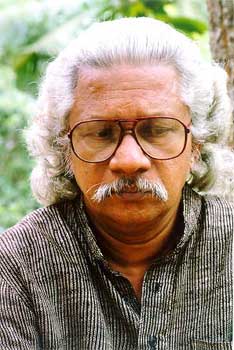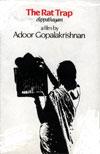|
“Elippathayam,” made in 1981, is Gopalakrishnan’s first colour film,
and almost the entire film is a sequence of beautifully framed shots of
rural life in Kerala. Colour is used sparingly and mainly as a symbol
to depict the nature of a character. On the whole, the film is highly
imaginative and, one must add, relentless in its portrayal of the
protagonist, the last heir of a disintegrating feudal order, as a rat
caught in a trap. Gopalakrishnan explained that change always occurs,
whether one consciously makes a choice or is a victim of others’
choices. The pace of the movie is inexorably slow, but the director
holds that the subject, the imperturbability of a rural setting, and
in this case the lazy lifestyle of a landlord, did not lend itself to
fast cuts.
Unni is the last male descendant of an erstwhile rich, landowning
family in Kerala who lives in the family house that has seen
unbroken cycles of birth and death for many generations. But now,
only the shadows remain, and in the shadows, Unni and his sisters,
Rajamma and Sreedevi.
Through the years the world has been changing outside Unni's home.
Unable to cope with the transformations around him, Unni avoids
confrontation with the changing reality by hiding behind his false
pride and self-centred silence. He also refuses to take any
responsibility for his inheritance, and the yeilds from the property
have to be looked after by an old retainer whose familiarity Unni
scorns. Rajamma, the second sister, is past the marriageable age.
The youngest sister, Sreedevi, a student in the local college, who
has been exposed to the world outside, escapes Rajamma's fate by
defiantly running away with a man. Unni, who is actually incapable
of taking a stand, reacts to the event by hiding like a rat in his
own home. He does not even try to look for Sreedevi. Rajamma watches
with helplessness and despair Unni's growing paranoia, and finally
collapses under her mental and physical strain. Finding her
unconscious, helpful villagers carry her away under the guilt-ridden
eyes of her brother, never to return.
Alone in the house of shadows, Unni locks all doors and
refuses to have anything to do with the outside world. As the lamps
go out and the shadows darken, he sits like a trapped rat, waiting
for his doom. In the darkness of the night the door crashes in, and
strange hands drag Unni to the pond near the house where Sreedevi
used to drown the rats she caught in her carved wooden trap.
Standing in the water, near the steps of the pond, Unni cringes
like a rat, as if begging his unknown assailants for mercy in his
final act of compromise.
|
|
Biofilmography
Adoor GopalaKrishnan was born in the Adoor village of Kerala in 1941.
Kathakali was part of life, when he was a kid, in the family. But later,
the theatre and camera took that place. By the time he entered the Film
and Television Institute of India (FTII) in Pune in 1962, he had already
written over a dozen plays and produced eight. Adoor made several
documentaries and films which won several national and international
awards.

Films
1972: Swayamvaram (One's Own Choice)
1977: Kodiyettam (Ascent)
1981: Elippathayam (Rat Trap)
1984: Mukhamukham (Face to Face)
1987: Anantaram (Monologue)
1989: Mathilukal (The Walls)
1993: Vidheyan (The Servile)
1995: Kathapurushan (Man of the Story)
|
|


